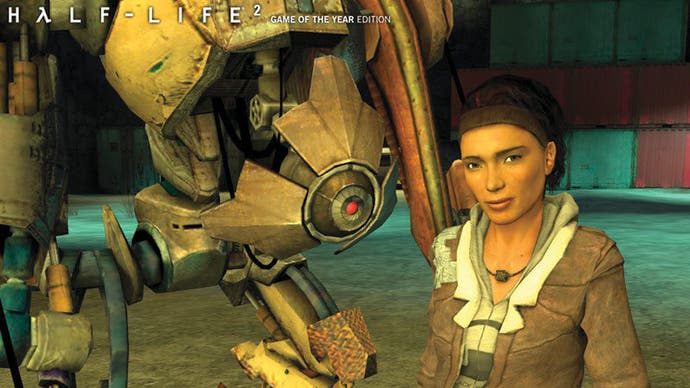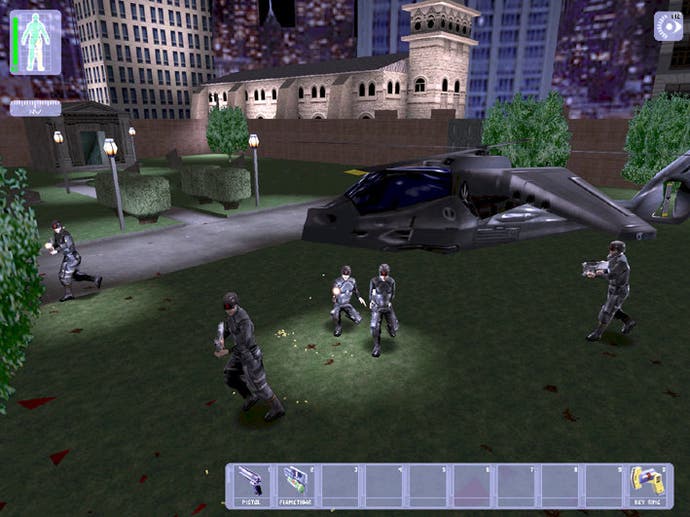Eurogamer's Lifetime Top 10
Editors past and present have a 10th-birthday squabble over what's best.
4. Half-Life 2
Valve / PC, PS3, Xbox 360
Oli Welsh: Strange as it might seem now, I'm not a PC gamer by tradition, or even inclination. But before WOW welded me to a mouse and keyboard, there was one series that could reliably get me to break my console habits, and it was Half-Life. I dimly remember a curtained weekend, starting and twitching my way through the tense original. I much more clearly remember forcing a melting laptop to stutter through this eerie masterpiece a few weeks before Blizzard claimed my soul.
Coming back to it years later when it was bundled with the Orange Box, I found myself vaguely disappointed by the point-and-click gunplay, and maybe the remarkable physics has lost some of its shattering impact. But the artwork is still incredible, as haunting a vision of totalitarianism and decay as you've ever seen. And the unobtrusive storytelling through the scene is an object lesson in how to do narrative in games. Valve may be the masters of technology, but this is their work of art.
Kristan Reed: For me, the very best aspect of Valve's masterpiece was its ability to continually reinvent itself, to the point where it felt like you'd played about six different games - some that would make thrilling long-form games in their own right if the ideas had been followed through in the same way that other FPS titles have. But perhaps that's the beauty of a Valve title - that ability to condense a single amazing idea into a level, and then merely leave it there. Valve has always excelled at leaving us wanting more, and that's precisely why we love them. Could we possibly have some more now, please?

Rob Fahey: Probably the most ambitious sequel in videogames history. Also, probably the best. FPS is a crowded genre, but Half-Life 2 stands alone. Nobody before or since has come close to the atmosphere of City 17 and its environs, to the sheer variety and lateral thinking of Valve's game design, or to the wonderfully understated nature of its characterisation and storytelling. Also, Dr Breen looks very much like my dad, which gives the whole affair a slightly otherworldly, hallucinogenic feel - although that's obviously something not many of you will share, unless he's been far more prolific that he lets on.
John Bye: I never quite got into Half-Life 2. The drab, grey East European setting didn't do any favours to the game's low-tech engine, the much vaunted physics system had the same floaty feeling that most Havok-based games tend to suffer from, and the in-game cut-scenes stopped impressing after I got bored one time and emptied a clip full of bullets into Al's head in the middle of a conversation, only for her to carry on yapping away as if nothing had happened.
Unfortunately my one abiding memory of Half-Life 2 is the Water Hazard chapter, in which you pilot a little boat down a polluted river until you reach some kind of obstruction, then hop out and either move some barrels around or fight your way through a series of dull concrete rooms to reach a control wheel. Over and over again. For about half an hour. It was somewhere around this point that I lost interest, and promised myself I'd never get sucked in by internet hype again.
Tom Bramwell: While I sympathise with John's problem with the boat bit, I'm stunned that he wasn't able to maintain a connection with this, probably the best first-person shooter ever made. I still remember the first screenshots, and seeing it running for the first time, and the first time I saw the Citadel, and the first time Breen said "...our benefactors", and the first time I fired a sawblade out of the gravity gun, and the first time I saw an antlion, and the first time I fought a strider. So much, so much more.
Even the incidental details are fantastic - the little houses along the coast, each with its own little story told in cadavers and splinters, foreshadowing the FPS's future swing towards RPGs, or the supposedly redundant enemies, like the spider headcrabs with their all-but-one-HP-sapping pounce attacks. And Dog!
I haven't enjoyed the subsequent episodic releases as much. I feel as though I'm being told a bit too much in the process (Half-Life always did so well precisely because it was mysterious), and the gameplay shifts and ideas haven't been as profoundly interesting as those in Half-Life 2. The iterative design process has had, uh, "fringe benefits" (Team Fortress 2, Portal and Left 4 Dead, for instance), but I still yearn for Valve to do another, proper, blow-your-head-off game-changer. In a profession where it's increasingly difficult for even the most ambitious and inventive game to throw us off-balance, it's easy to remember just how much and how often Half-Life 2 did so.
3. Deus Ex
Eidos / Ion Storm / PC
Kristan Reed: Many games promise to offer gamers freedom to play them the way you want to, but so rarely do they actually deliver on any meaningful level. For some reason, Deus Ex made me want to play like the crazed stealth assassin, sneaking around in my long leather coat zapping everyone in the cranium from 100 feet. What a shame.

Somehow, despite the wooden character models and gruff voice acting, there's an atmosphere and intrigue about the narrative that elevates the game to legendary status. If a capable team can build on the achievements of Ion Storm with modern tech, one of the best games ever is waiting to be made. Even as it stands, this one comes pretty close.
Rob Fahey: Deus Ex is still a shining example of what games can do, if they only try. After years of corridor shooters, a game which genuinely had many different ways to approach and solve each situation was a revelation - at times, the choices it subtly presented seemed almost overwhelming. Not only that, it was relentlessly stylish and entertaining - today, it looks dated, but it still plays like a game ahead of its time. I'm more of a fan of the sequel than most people seem to be, but frankly, nobody has ever bottled the Deus Ex magic since then - not even the spiritual successor to the intelligent FPS genre, BioShock. The graphics are better, the storytelling craft has improved, but the gameplay is still a mere shadow of what Ion Storm Austin managed all those years ago.
